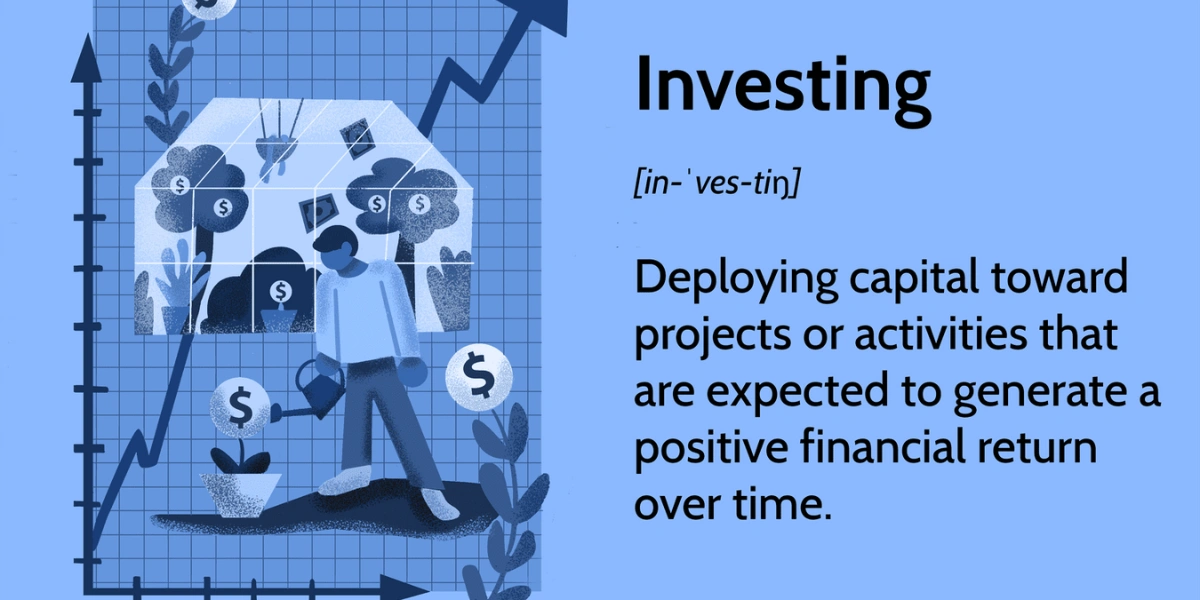What is a Financial Investment? – Definition, Types & Examples
Finance and investment are central to personal and corporate growth, providing the foundation for wealth management and economic development. From personal finance strategies to understanding investment opportunities, this guide aims to provide actionable insights for readers. Whether you’re an aspiring finance student or a seasoned investor, the concepts and strategies discussed here are relevant for success in today’s fast-paced world.
Introduction to Finance and Investment
Why do Finance and Investment Matter in 2025?
In 2025, finance and investment have taken on new dimensions. With the global economy recovering from recent challenges, people are more focused on building financial security. Finance involves managing resources, from budgeting to acquiring capital, while investment is about allocating resources to generate future income. Together, they form the backbone of personal and corporate success.
The Evolution of Finance: From Basics to Complex Strategies
Over the years, finance has evolved beyond simple money management to include advanced concepts like financial planning, risk management, and portfolio optimization. Investment strategies now incorporate technology, sustainability, and global trends, making them more dynamic and inclusive.
Finance and Investment at the University of Nebraska-Lincoln

What Makes the University of Nebraska-Lincoln a Top Choice?
The University of Nebraska-Lincoln (UNL) is recognized for its strong finance and investment programs. The university emphasizes practical knowledge and analytical skills, equipping students to excel in fields like corporate finance, investment banking, and real estate finance.
How to Apply: Finance and Investment Acceptance Rate at UNL
The acceptance rate for finance and investment programs at UNL reflects its competitiveness. While the exact rate varies yearly, the university maintains a balanced approach, ensuring diversity and inclusion. Prospective students are advised to prepare strong applications showcasing their academic achievements and passion for finance.
Career Opportunities After Studying Finance at UNL
Graduates from UNL find opportunities in various sectors, including financial consulting, investment management, and corporate advisory roles. The university’s alumni network and industry connections give students a head start in their careers.
The Role of Finance Companies and Investment Banks
Key Differences Between Finance Companies and Investment Banks
While both finance companies and investment banks deal with money, their functions differ significantly:
- Finance Companies: Focus on providing loans and credit to individuals and businesses.
- Investment Banks: Help companies raise capital, manage mergers, and offer strategic financial advice.
For example, Cholamandalam Investment and Finance Company Limited specializes in loans and asset financing, serving as a key player in the financial services industry.
How do Investment Banks Drive Corporate Growth?
Investment banks play a pivotal role in helping businesses scale. By managing public offerings and securing funds, they enable companies to expand operations, enter new markets, and innovate.
Why Finance Companies Are Essential for Personal Borrowing?
Finance companies bridge the gap for individuals and small businesses that need funding. Whether it’s for purchasing a vehicle, starting a business, or funding personal projects, these companies provide tailored financial solutions.
Operating, Investing, and Financing Activities Simplified
Breaking Down Operating Activities in Financial Statements
Operating activities represent the core business processes of a company, such as revenue generation and expense management. These activities are crucial for understanding a company’s day-to-day operations.
What Are Investing Activities and Why Are They Important?
Investing activities involve the acquisition or sale of long-term assets like property, equipment, or securities. These activities indicate how effectively a company is using its resources to drive growth.
Understanding Financing Activities for Long-Term Stability
Financing activities involve raising capital through debt or equity and managing repayments. A healthy balance of financing activities ensures a company’s long-term stability and growth.
Personal Finance and Investing Tips
Beginner’s Guide to Managing Personal Finance in 2025
Managing personal finance begins with understanding your income, expenses, and financial goals. Start by creating a monthly budget and tracking your spending.
Top 5 Mistakes to Avoid in Personal Finance
- Overspending without budgeting.
- Ignoring the importance of saving.
- Not investing early.
- Taking on excessive debt.
- Lack of financial education.
How to Start Investing: A Step-by-Step Guide
- Set clear financial goals.
- Research investment options, such as stocks, mutual funds, and real estate.
- Start small and diversify your portfolio.
- Monitor your investments regularly.
The Role of Budgeting in Financial Independence
A budget is the foundation of financial independence. By allocating funds for essentials, savings, and investments, you can achieve your financial goals while avoiding unnecessary debt.
Popular Finance and Investment Courses Around the World
Top Universities for Finance and Investment Degrees
Institutions like the University of Nebraska-Lincoln, the London School of Economics, and Harvard University offer world-class finance programs.
What to Expect in a Finance and Investment Program?
Expect to learn about topics like corporate finance, portfolio management, and risk analysis. Many programs incorporate real-world applications and internships.
How to Choose the Right Finance Course for Your Goals?
Choose based on career aspirations: aspiring analysts should focus on quantitative-heavy programs, while entrepreneurial students may prioritize strategy and innovation.
Exploring Real Estate Finance and Investments
Why Real Estate Is a Timeless Investment Option?
Real estate offers stability and potential for high returns, making it a preferred choice for long-term investors. Property values tend to appreciate over time, providing a reliable wealth-building strategy.
The Basics of Real Estate Finance: What Every Investor Should Know
Understanding real estate finance involves knowledge of mortgages, property taxes, and market trends. Researching the right location and property type is crucial for maximizing returns.
Benefits of Real Estate Investing for Long-Term Growth
- Steady rental income.
- Tax benefits on property ownership.
- Diversification of investment portfolio.
- Potential for significant appreciation.
How to Diversify Your Portfolio with Real Estate?
Diversifying your portfolio with real estate reduces overall investment risk. Consider options like commercial properties, rental units, or real estate investment trusts (REITs).
Cholamandalam Investment and Finance Company Limited: A Case Study
Understanding the Cholamandalam Share Price Trends
The Cholamandalam Investment and Finance Company Limited is a leading financial services provider in India. Monitoring its share price provides insights into its market performance and growth potential.
Why Investors Are Watching Cholamandalam Investment and Finance Company Limited
Investors are drawn to Cholamandalam due to its consistent performance and diverse product offerings, such as vehicle loans, home loans, and small business financing.
Is Cholamandalam a Good Investment in 2025?
With a focus on innovation and customer-centric solutions, Cholamandalam remains a promising choice for investors. However, thorough research and risk assessment are essential before investing.
Advanced Finance and Investment Strategies
How to Analyze Financial Statements for Better Investments?
Financial statements provide a snapshot of a company’s health. Focus on key metrics like revenue, profit margins, and debt-to-equity ratio to make informed decisions.
Diversification: Why It’s Crucial for Investment Success
Diversifying your investments across asset classes minimizes risk and maximizes returns. Include a mix of stocks, bonds, real estate, and mutual funds in your portfolio.
The Role of Technology in Modern Investing
Technology has revolutionized investing with tools like robo-advisors, AI-driven analytics, and mobile trading apps. These innovations make investing accessible and efficient for everyone.
How Technology is Revolutionizing Finance and Investment

Technology is transforming the finance and investment landscape, making processes more efficient, accessible, and secure. From mobile banking to blockchain, advancements in technology have redefined how individuals and businesses interact with money. FinTech companies are streamlining transactions, AI is improving decision-making, and blockchain ensures transparency.
These tools provide investors with real-time insights, reduce costs, and minimize risks. Machine learning algorithms are now capable of predicting trends, while robo-advisors offer personalized investment plans. Meanwhile, blockchain revolutionizes security in financial transactions. Collectively, these innovations make finance and investment more inclusive, reshaping the global financial ecosystem in unprecedented ways.
Future of Finance and Investment
Trends Shaping Finance and Investment in 2025
- Green finance and sustainable investing.
- Increased reliance on digital payment systems.
- Blockchain and cryptocurrency adoption.
How Artificial Intelligence Is Changing Investment Strategies?
AI-driven algorithms provide data insights, predict market trends, and automate trading processes, making investment strategies more effective.
The Impact of Green Finance on Global Markets
Green finance focuses on funding environmentally sustainable projects. This trend aligns financial growth with ecological preservation, attracting conscious investors.
Conclusion: Finance and Investment
Finance and investment are indispensable tools for building a secure future. By understanding concepts like operating, investing, and financing activities and exploring opportunities like real estate and stock markets, you can achieve financial independence. Whether you’re inspired by the programs at the University of Nebraska-Lincoln or analyzing the Cholamandalam share price, the key to success lies in informed decisions and consistent effort.
FAQs About Finance and Investment
Q. What is Finance?
Q. What Is the Best Strategy for Beginner Investors?
Start with low-risk investments like index funds or bonds and gradually diversify into higher-risk assets as you gain experience.
Q. How Do I Monitor My Investments Effectively?
Use financial apps or online platforms to track your investments. Regularly review your portfolio to ensure it aligns with your goals.
Q. Is Real Estate a Better Option Than Stocks?
Both have their advantages. Real estate offers stability, while stocks provide higher liquidity and faster returns. A balanced approach is ideal.
